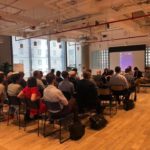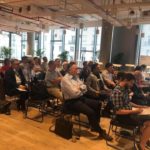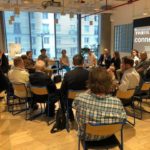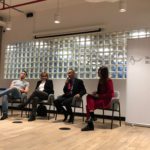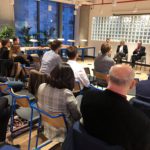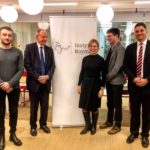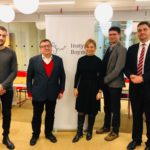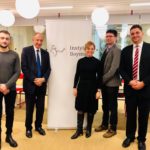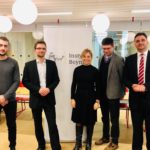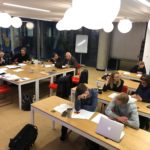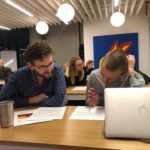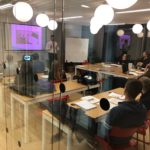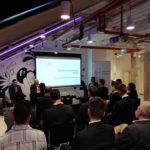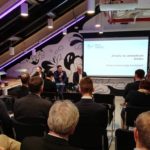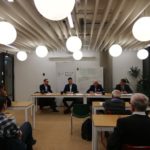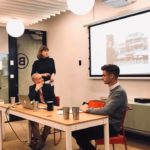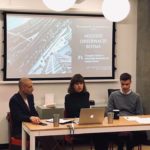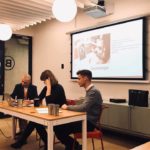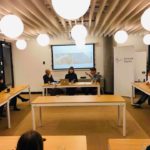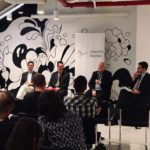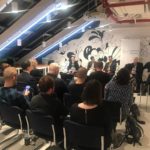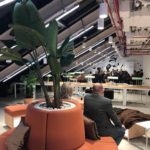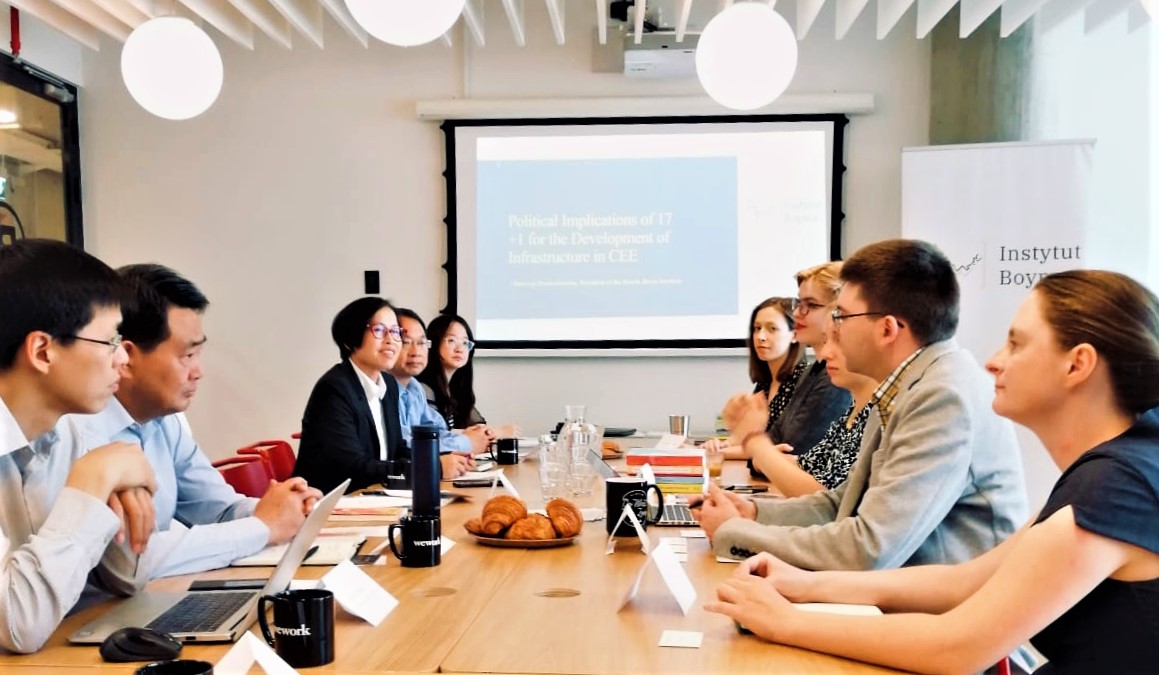
In June and July, thanks to the intensive work of our team, we organized many events: lectures, debates, author meetings and conferences. We have a space where every guest can feel comfortable. Traditionally, after each meeting we organize networking. We want our Institute to be a friendly and open place for everyone and become a platform for exchanging views, making valuable acquaintances, as well as for deepening knowledge.
We will be glad to organize conferences and scientific meetings at your request.
Below we present a photo gallery from our June and July events.
Debate “All to the right – how the Indian People’s Party (BJP) of Prime Minister N. Modi won the elections and what does this mean for the world?” (6.06.2019)
We organized the debate together with the Asia Research Center. Panelists from the Boym Institute (Krzysztof Zalewski), Asia Research Center (Krzysztof Iwanek) and Polish Institute of International Affairs (Patryk Kugiel) took part in it. Debate was moderated by Patrycja Pendrakowska.
Workshops: Writing analytic texts (21.06.2019)
During the first organized at the Boym Institute workshops participants learned about the secrets of creating and editing good analytical texts. Krzysztof Zalewski, the lecturer, shared with listeners his extensive knowledge gained during his professional career.
Conference with the participation of the China Academy of Governance delegation (24.06.2019)
During the meeting, we discussed the possibilities of cooperation, the current role of China in the world in the context of the contemporary international order and the relations between Poland and the PRC. The CAG delegation was very pleased with the warm reception and the environment conducive to such meetings.
Paweł Behrendt’s lecture “The New Doctrine of Pentagon and the Geopolitical Environment of East Asia” (24.06.2019)
After the lecture there was time for networking and a discussion on the current situation in the Asia-Pacific region. We hosted, among others, Dr. Muhammed Younis from Pakistan, as well as representatives of Russia and Vietnam.
Chinese Renaissance: meeting with professor Bogdan Góralczyk (27.06.2019)
Professor Bogdan Góralczyk is not only a diplomat and a great sinologist, but also the author of the book “The Great Renaissance: Chinese transformation and its consequences”, hailed as the book of the year in the field of world politics. At the author’s meeting, we discussed the consequences of Chinese transformation for world order and other issues related to contemporary China. The meeting was very popular and the discussion after the professor’s lecture lasted until late evening.
North Korean overseas laborers in Poland – meeting with Nicolas Levi (4.07.2019)
We organized the meeting with our analyst and member of the management board, Dr. Nicolas Levi, about North Korea and North Koreans who works in Poland. The main topic was related with his newest book “A statistical analysis of the North Korean overseas laborers in Poland during the period 2000-2017”
Debate “Three years after the verdict of the Permanent Court of Arbitration for the South China Sea – what is the future of the basin?” (11.07.2019)
We organized the debate together with the Institute of Sociology at the University of Warsaw. Speakers from the University of Lodz (Małgorzata Pietrasiak), Polish Institute of International Affairs (Damian Wnukowski) and the Boym Institute (Maksym Gdański, Andrzej Anders) participated in the panel. Our special guest and keynote speaker was Dr. Muhammed Younis from Pakistan.
Debate “Challenges in Asia” (22.07.2019)
By trying to make a balanced contribution to debate about challenges in Asia, we’ve made a report that describes various problems of asian countries. On this occasion, we also organized the debate, in which we talked about report’s conclusions.
What with Hongkong? (28.08.2019)
Whole world (not only Donald Trump) is looking at Hongkong protests. How will it end? Why economic and legal aspects are crucial for every scenario? What is the connection between “year 2047 problem” and these events? Our analyst, Adrian Zwoliński, answered all these questions during the meeting dedicated to this topic.
Economic cooperation between Poland and North Korea (9.09.2019)
We organized meeting with our analyst and member of the management board, Dr. Nicolas Levi, about chances and dangers for polish entrepreneurs, who wants to cooperate with their north korean counterparts.
Visitor’s Day at the Boym Institute (20.09.2019)
We decided to organize less conventional and academic meeting to get you know about our activity, take a part in discussion and see fruits of our work from last months. As always, we ended with time for networking.
Intercultural communication: how to talk, to be understood? (3.10.2019)
In the meeting participated Krzysztof Darewicz (sinologist and journalist), Dr. habil. Grażyna Aniszewska-Banaś (who analyses cultural aspects of international business), Dr. Nicolas Levi (analyst at the Boym Institute) and Dr. Sergiusz Prokurat (scientific worker at the Institute of Economics of Polish Academy of Sciences).
2019 elections: Poland towards Asia, Africa and Latin America (4.10.2019)
Thanks to our team efforts, we have managed to organize the debate about polish strategy towards developing countries right before elections. Our guests were polish politicians: Władysław Bartoszewski (Polish People’s Party), Michał Wawer (Confederation Liberty and Independence), Piotr Gadzinowski (Democratic Left Alliance) and Wojciech Zabłocki (Law and Justice).
Workshops: Writing analytic texts (5.10.2019)
Success of the first edition of workshops about writing analytic texts encouraged us to make a second edition of this helpful for many starting journalists and analysts event. This time in broaden, two days formula.
Changes on the Silk Road: where Central Asia goes? (28.10.2019)
In the discussion participated H.E. Margulan Baimukhan (Ambassador of Kazakhstan in Poland), Dr. Andrzej Filipowicz (advisor of government of Uzbekistan in field of law reforms), Dr. Magdalena Sobańska-Cwalina (Central Asia analyst at the Boym Institute), Adrian Malinowski (Chief of Department of Trade and International Cooperation in the Ministry of Entrepreneurship and Technology), H.E. Bahrom Babaev (Ambassador of Uzbekistan in Poland), Piotr Guzowski (Chief of Polish-Kazakh Chamber of Trade and Industry).
USA-Iran: War or peace? (4.11.2019)
We organized the debate together with the Asia Research Center, in which participated Krzysztof Płomiński (former ambassador of Poland in Iraq and Saudi Arabia, author of “Arabia Incognita” and diplomatic advisor of Polish Chamber of Commerce), Łukasz Przybyszewski (West Asia analyst at the Center for Security Studies) and Antoni Jakubowski (analyst at the Boym Institute).
Boym Urban Studies: China – Chengdu and Guangzhou (29.11.2019)
During the meeting we talked about relations between natural environment and societies of rapidly growing cities, also about role of the urban and regional infrastructure in process of sustainable development. This led us to discussion about general characteristics of urbanization in China.
Central Asia: wheter lasting peace is possible? (2.12.2019)
We discussed about topics related with the newest book of our analyst, Dr. Jerzy Olędzki. Except the author, in the meeting participated prof. Bogdan Góralczyk and Dr. Magdalena Sobańska-Cwalina.
Fake news and troll farms in duty of third world war (17.12.2019)
Debate over undercover journalists’ reports of Anna Sobolewska (“Superwizjer”, TVN) and Katarzyna Pruszkiewicz (Reporters Foundation), in which they showed how organized media groups promoted visions of third world war and fall of the West. We talked about how dezinformation industry influences public opinion.
We invite you to follow our pages on social media and the official website of the Institute – we are planning to organize next events in the near future.
czytaj więcej
Patrycja Pendrakowska as a founding member of the WICCI’s India-EU Business Council
By sharing knowledge, business opportunities, and best practices the Council generates awareness of women's contributions in developing the India-EU relations.
Searching for Japan’s Role in the World Amid the Russia-Ukraine War
The G7 Hiroshima Summit concluded on May 21 with a communiqué reiterating continued support for Ukraine in face of Russia’s illegal war of aggression. Although Japan was perceived at the onset of the war as reluctant to go beyond condemning Russia at the expense of its own interests, it has since become one of the leading countries taking action during the war.
Rintaro NishimuraBeyond Grey Hulls: Europe’s Role in “Crowdsourcing” Maritime Domain Awareness in the South China Sea
If developments observed in the South China Sea over the recent months are of any indication, it simply means that the situation has worsened. China’s continued aggression towards its neighbors – the Philippines and Vietnam in particular, has continued unabated.
Collin KohBorder conflicts as political tools: the Thailand–Cambodia crisis
The border conflict between Thailand and Cambodia is much more than just a territorial dispute. Rooted in historical ambiguities, it has become a tool for domestic political maneuvering in both countries and a stage for international strategic competition.
Andżelika SerwatkaWICCI’s India-EU Business Council – a new platform for women in business
Interview with Ada Dyndo, President of WICCI's India-EU Business Council and Principal Consultant of European Business and Technology Centre
Ada DyndoAsia-Integration – Follow-up Report on Polish Policy Challenges Towards Asian Countries
The debate was the consequence of positive reactions to the open letter that the Boym Institute published in the summer of 2020. Many of its readers pointed out the necessity of broad consultations regarding the principles of the new multidimensional policy in order to reflect the diversity of perspectives, interests and conditions.
Book review: “North Korean Defectors in a New and Competitive Society”
Book review of "North Korean Defectors in a New and Competitive Society", written by Lee Ahlam - assistant professor in the Department of Educational Leadership and Human Resource Development at Xavier University Cincinnati, Ohio.
Nicolas LeviThe unification of the two Koreas: an ASEAN perspective
The aim of the paper is to discuss the role of the ASEAN as a critical component of the solution to the Korean unification. The Korean Unification refers to the potential reunification of both Koreas into a single sovereign Korean state led by the leadership of the two Koreas.
Nicolas LeviCoronavirus (COVID-19) outbreak and emerging contractual claims
With China one of the key players in the global supply chain, supplying major manufacturing companies with commodities, components and final products, the recent emerging outbreak of Coronavirus provides for a number of organizational as well as legal challenges.
“May you be the mother of a thousand sons” – the status of women in Indian society
The 1950 Indian Constitution introduced the principle of equal opportunities for gender equality, which grants women and men the same rights in family life, political, social and economic life. So why is it that nearly forty per cent of girls aged 15-17 do not attend school, the custom of dowry giving is still cultivated and prenatal sex selection is still a huge social problem?
Magdalena RybczyńskaYoung Indo-Pacific: Forward-looking perspectives on the EU Indo-Pacific Strategy
The Boym Institute, working with other think tanks, organizes panel discussions on topics related to the European Union's Indo-Pacific strategy
Women’s liberation in China: interview with prof. Wu Lijuan
Interview of Ewelina Horoszkiewicz with prof. Wu Lijuan - Associate Professor at the Department of Sociology at Peking University. Her research concentrates on the gender issues and social changes brought about by globalization. She wrote a book “Job Placements and Job Shifts in China: The Effects of Education, Family Background and Gender”.
Ewelina HoroszkiewiczBook review: “North Korea’s Cities”
Book review of "North Korea’s Cities", written by Rainer Dormels and published byJimoondang Publishing Company in 2014.
Nicolas LeviOpportunities and challenges of India’s G20 Presidency
Ada Dyndo conducts an interview with Shairee Malhotra on India’s role in G20. Shairee Malhotra serves as a Coordinator of the T20 India Taskforce on Reformed Multilateralism for India’s G20 presidency.
Ada DyndoIn the first part of this analysis of Ulaanbaatar’s winning 2040 General Development Plan Conception (GDPC) I look into the historical preconditions for the city’s planned development as well as present the legislative climate in which works on Ulaanbaatar’s future development strategies have recently found themselves.
Paweł SzczapAssessing the New U.S. National Security Strategy: Key Takeaways on Asia
On 4th December 2025 the Donald Trump administration released the new National Security Strategy (NSS) of the United States of America. What are the key takeaways on Asia?
Jakub WitczakRoman Catholic cemetery in Harbin (1903-1958)
First burials of Catholics, mostly Poles but also other Non-Orthodox believers took place in future Harbin in the so called small „old” or later Pokrovskoe Orthodox cemetery in the future European New Town quarter and small graveyards at the military and civilian hospitals of Chinese Eastern Railway at the turn of XIX and XX century.
Jerzy CzajewskiThe link between EU Aid and Good Governance in Central Asia
Nowadays all the CA states continue transitioning into the human-centered model of governance where the comprehensive needs of societies must be satisfied, nevertheless, the achievements are to a greater extent ambiguous.
How to deal with gender-based segregation?
Interview on the project Supporting the Economic Empowerment of Afghan Women through Education and Training in Kazakhstan and Uzbekistan. Magdalena Sobańska-Cwalina and Krzysztof M. Zalewski (The Boym Institute) in discussion with: Yakup Beris, Johannes Stenbaek Madsen, Maria Dotsenko, Gulnar Smailova,
Zespół Instytutu BoymaInvest and cooperate with Serbia or Poland? A dilemma for South Korean companies
This paper explains why Serbia may replace Poland as a strategic outsourcing centre for South Korean companies in Central and Southern Europe.
Nicolas LeviSan Zhong Zhanfa or Three Warfares. Chinese Hybrid Warfare
Cognitive operations are becoming an increasingly significant and common element of non-kinetic military operations. States and other political players deliberately manipulate the way their actions, those of their allies and those of their adversaries are perceived by the governments and societies of other international players.
Paweł Behrendt“Green growth” may well be more of the same
Witnessing the recent flurry of political activity amid the accelerating environmental emergency, from the Green New Deal to the UN climate summits to European political initiatives, one could be forgiven for thinking that things are finally moving forward.
Dawid JuraszekThe number of confirmed executions and frequent disappearances of politicians remind us that in North Korea the rules of social Darwinism apply. Any attempt to limit Kim Jong-un's power may be considered hostile and ruthless.
Roman HusarskiChina’s Social Credit System – How will it affect Polish enterprises in China?
The Social Credit System currently being rolled out in China may pose significant organisational and legal challenges for both foreign and Polish entities operating in China. We invite you to read our report, prepared in cooperation between the Boym Institute and Kochanski & Partners.
Patrycja Pendrakowska

